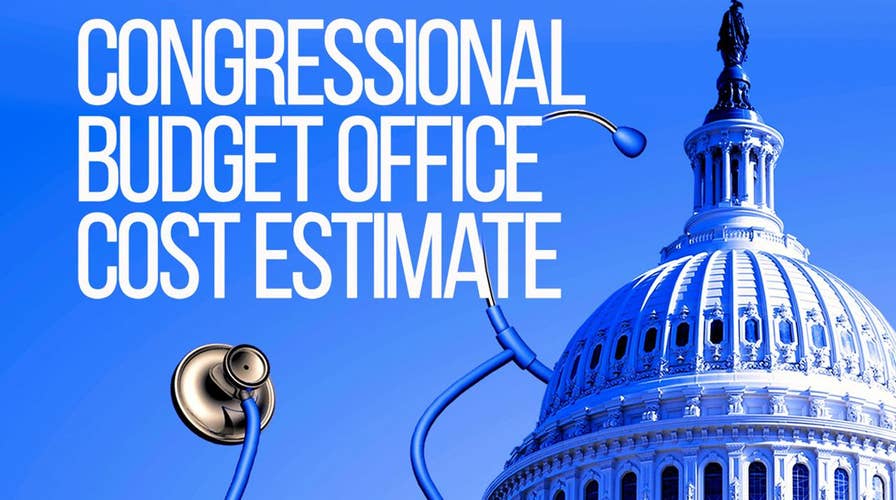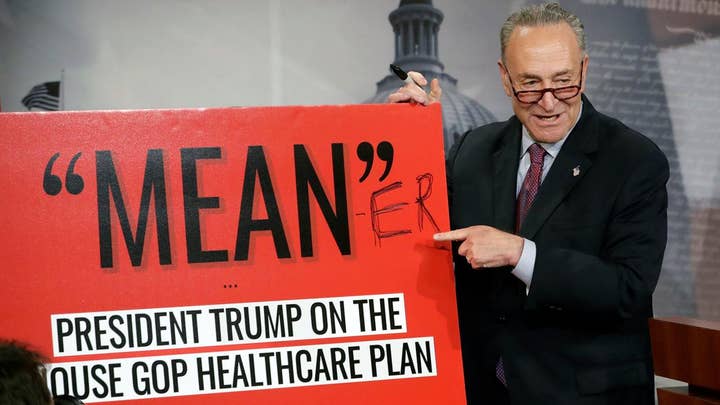CBO: 22 million more uninsured; $321 billion saved
On 'Special Report,' Mike Emanuel explains how the score will affect the Senate Republican healthcare reform bill
Senate Republicans’ health care bill would reduce the federal deficit and eventually lead to lower premiums, but would result in millions more Americans being uninsured a decade from now, according to a fresh analysis from Capitol Hill’s nonpartisan budget scorekeepers.
The bill’s highly anticipated “score” was released Monday afternoon and immediately became part of the Senate’s raging health care debate as GOP leaders scramble to win over reluctant Republicans and tee up a vote to repeal and replace much of ObamaCare as early as this week.
The Congressional Budget Office estimate is an important factor, but its impact could be mixed.
In terms of coverage, the CBO and Joint Committee on Taxation report said the proposal would increase the number of uninsured by 22 million in 2026 relative to current law.
This is “primarily because the penalty for not having insurance would be eliminated,” the analysis noted, adding lower Medicaid spending and smaller subsidies also would reduce enrollment in later years.
But the budget impact could be appealing to fiscal conservatives. In large part due to Medicaid changes, the report said the legislation would cut deficits over the next decade by $321 billion.
"Our plan will help address Obamacare's ballooning costs for consumers by lowering premiums over time and cutting taxes, and today's estimate confirms that," Sen. John Cornyn, R-Texas, said. "I look forward to continuing to work with my colleagues this week as we get closer to finally replacing this failed law with better care at a cost that Texans will be able to afford."
The White House immediately took issue with the CBO estimate, saying in a statement that the office "has consistently proven it cannot accurately predict how healthcare legislation will impact insurance coverage.
"This history of inaccuracy, as demonstrated by its flawed report on coverage, premiums, and predicted deficit arising out of Obamacare, reminds us that its analysis must not be trusted blindly," the statement went on.
The report said the bill would increase average premiums in the nongroup market leading up to 2020 and lower average premiums after that year, relative to the current law.
“In 2020, average premiums for benchmark plans for single individuals would be about 30 percent lower than under current law. A combination of factors would lead to that decrease—most important, the smaller share of benefits paid for by the benchmark plans and federal funds provided to directly reduce premiums,” the estimate says.
In some ways, the “score” was better for the Senate bill than for the related House bill that passed last month, projecting more deficit savings and better enrollment.
But foes were not impressed.
“Saying the Senate health care bill is less mean than the House bill is like saying you prefer small pox over the bubonic plague,” AFL-CIO President Richard Trumka said in a statement.
Shortly after the CBO score came out, Senate Minority Leader Chuck Schumer, D-N.Y., said, "This bill is every bit as mean as the House bill. This CBO report should be the end of the road for Trumpcare. Republicans would be wise to read it as a giant stop sign."
Right now, Senate Majority Leader Mitch McConnell, R-Ky., faces a steep climb getting the votes for the bill.
At least five Republicans have come out against the bill in its original form, meaning McConnell would have to offer changes for the plan to have a chance at passage. Republicans hold a slim 52-seat majority and would need a minimum of 50 senators – plus Vice President Pence as the tie-breaker – to pass the bill.
Power players in the health care fight already were taking sides even before the CBO estimate was released. The American Medical Association (AMA) sent a letter to McConnell on Monday expressing concerns with Medicaid provisions of the bill.
“It would be a serious mistake to lock into place another arbitrary and unsustainable formula that will be extremely difficult and costly to fix,” AMA CEO and Vice President James Madara, M.D., wrote. “We believe that Congress should be working to increase the number of Americans with access to quality, affordable health insurance instead of pursuing policies that have the opposite effect.”
On the other side, Anthem Inc., the nation’s second-largest health insurer, endorsed the Senate plan.
“We believe the Senate discussion draft will markedly improve the stability of the individual market and moderate premium increases,” an Anthem statement read. The company announced last week it plans to pull out of ObamaCare exchanges in Indiana and Wisconsin next year.
Some Republicans have downplayed the CBO’s reliability on health care from the start.
In a move widely criticized by Democrats, the House brought its version of the health care bill to the floor before a CBO score was even released. The House narrowly passed its version on May 4.
Weeks later, the CBO estimated the House bill would reduce the federal deficit by $119 billion by 2026, but also leave at least 23 million more Americans uninsured than under ObamaCare over that same time period.
Moments after the CBO score on the House bill was released last month, Republicans downplayed the figures. The Republican National Committee released a statement at the time slamming the CBO, saying they have “a long track record of being way, way off” in their modeling.
Senate Republicans rolled out modest revisions to their health care bill on Monday, including a penalty for Americans who have a lapse in insurance coverage.
McConnell is hoping to hold a vote before the July 4 holiday but currently does not have them.
Republican Sens. Rand Paul, R-Ky.; Ted Cruz, R-Texas; Mike Lee, R-Utah; Ron Johnson, R-Wis.; and Dean Heller, R-Nev., have come out against the bill in its current form.
Paul told reporters on Capitol Hill last week the he “didn’t run on ObamaCare lite.”
“I think we can do better than this—my hope is not to defeat the bill, but to make it better,” Paul said. “Now the discussions begin—I think it could take longer than a week.”
Fox News' Chad Pergram and Mike Emanuel contributed to this report.








